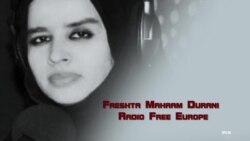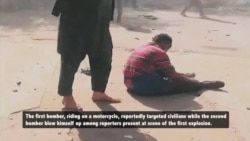As World Press Freedom Day approaches, the Afghan media community has suffered a severe blow by losing nine of its members in a single day.
Islamic State (IS) terror group militants killed nine Afghan journalists and injured five other reporters Monday in a twin suicide bombings in the heart of Kabul, the capital city of Afghanistan.
Frustrated by the Afghan media's reporting, IS is trying to spread fear and force Afghan journalists to be silenced, analysts say.
“IS wants to squash media freedom in Afghanistan by creating fear among the Afghan media community. It does not want the truth about its activities to come out. It seeks to force the media not to report against it and to present its own distorted propaganda,” Walter Dorn, a professor at Royal Military College of Canada & Canadian Forces College told VOA.
“The brave journalists of Afghanistan who continue to write and speak on important issues of the day should be praised and appreciated, not maligned and killed. They uncover corruption of governments, arms and drug dealers, and they need support,” he added.
Also Monday, unknown gunmen killed a BBC local reporter in eastern Khost province of Afghanistan. In a similar incident last week, unknown gunmen shot dead another Afghan journalist in southern Kandahar province. No group has claimed the responsibility for the attacks.
Journalists Targeted
During the past 15 years, more than 80 journalists, local and international, were killed in Afghanistan, more than 20 only in 2017, according to Afghanistan Journalists Safety Committee.
“IS and other terror groups are affected by media coverage of their gory attacks and are trying to force reporters into self-censorship. They are very much interested in preventing or limiting the coverage of human suffering aspects of their attacks,” Sediqullah Tawhidi, Chairman of Afghanistan Journalists Safety Committee told VOA.
“We have shown [to terrorists] in the past 15 years that the killing of our colleagues and targeting of the media community, will neither stop the news coverage nor they can silence the freedom of speech. Fear and terror cannot bar us from reporting,” he added.
Condemnation poured after the twin suicide attacks in the capital city of Kabul that killed 26 and wounded at least 50 others.
“I am furthermore outraged by the attack which appears to have deliberately targeted journalists; this attack, coming just ahead of World Press Freedom Day, is a direct assault on freedom of expression,” said Tadamichi Yamamoto, the Secretary-General’s Special Representative for Afghanistan and head of United Nation Assistance Mission in Afghanistan in statement to media.
Mohammad Ashraf Ghani, president of Afghanistan in a statement also expressed his support for Afghan media community. “Freedom of speech is an important achievement of the Afghan government and people, and we will preserve and protect it with everything we have in power.”
US should do more
General John Nicholson, U.S.-led NATO commander in Afghanistan said that such attacks will not weaken the Afghans.
“Make no mistake; the enemies of Afghanistan cannot win. Actions like this only strengthen our steadfast commitment to the people of Afghanistan,” Nicholson said.
Afghanistan experts, however, argue that what the U.S. is doing in Afghanistan is not enough, given the recent attacks in the country and that Washington needs to do more to eliminate IS from Afghanistan.
“I see a need for further U.S. airstrikes against ISIS targets in Afghanistan. The bombing, however, must be done patiently, precisely and without error so that the people of Afghanistan do not suffer collateral damage during the strikes,” Dorn added.
Kabir Ranjbar, Kabul based Afghanistan expert disagrees and says that violence in Afghanistan, either by the Taliban or IS, has roots in Pakistan.
“President Trump should fulfill his pledge and fully utilize his South Asia strategy. As I recall him warning Pakistan to stop supporting militants and insurgents groups, but he did not push it enough. The situation will change drastically in Afghanistan, if Mr. Trump imposes economic sanctions on Pakistan and its military intelligence, ISI [Inter-Services Intelligence],” Ranjbar told VOA.
“We are the biggest ally of the U.S. in the region. Afghans’ blood is being shed and the U.S. is only watching. This scenario has generated a negative reaction among Afghans,” he added.
Pakistan denies the charge that it is supporting any militant or insurgent groups.







